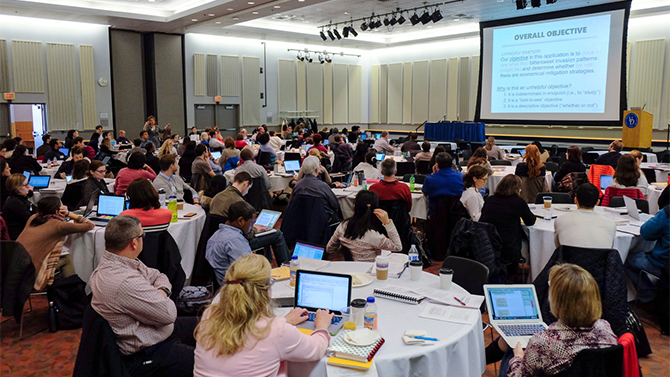


Writing winning grant proposals
Photo by Eric Tommer February 06, 2017
UD researchers learn tips for getting to ‘Grantsville’
When Lauren Broyles got her first research proposal funded, a mentor emailed his congratulations along with a favorite photo. It was of a sign greeting visitors to a small western Maryland town, but it holds additional meaning for university researchers: “Welcome to Grantsville.”
Getting a research grant takes fortitude and persistence — the competition is stiff, but you can improve how you argue for innovation in these intense applications, said Broyles, from Grant Writers’ Seminars and Workshops LLC, who presented the University of Delaware’s workshop on writing winning grant proposals on Jan. 30.
UD researchers submitted more than 1,700 proposals to external funding agencies in fiscal year 2015, according to Anshuman Razdan, associate vice president for research development in the Research Office, which hosted the workshop with UD’s seven colleges. During that time frame, over 600 proposals were funded — an impressive success rate of about 35 percent.
Charlie Riordan, vice president for research, scholarship and innovation, welcomed the attendees by emphasizing the importance of peer review. “The peer review process is rigorous — you will benefit greatly from sharing early drafts of your proposals with colleagues and mentors.”
During the day, more than 130 faculty got an in-depth look at the proposal applications of major federal funding agencies including the National Science Foundation, National Institutes of Health, National Endowment for the Arts, National Endowment for the Humanities and U.S. Department of Agriculture. They also received tips on how to develop an irresistible, fundable idea, the value of connecting with program officers, and what reviewers look for in a proposal, among myriad other topics.
A panel of UD researchers also gave advice. Dion Vlachos, Allan and Myra Ferguson Professor of Chemical and Biomolecular Engineering, who is leading several multimillion-dollar energy initiatives, provided pointers on how to approach developing such large endeavors — from defining a good problem to tackle, to assembling the right interdisciplinary team with the ability to collaborate, and lining up excellent administrative staff if you are pursuing a research center.
Randy Wisser, associate professor of plant and soil sciences, began building his professional network with people he got to know at academic conferences and meetings. He drew on that network to build proposal teams working on corn genetics and climate studies.
Wisser, who recently had two large proposals funded back-to-back, said he initially had a lot of naivete about managing such sizable grants. He didn’t budget for a project manager and quickly learned that having good support is critical. He also began to realize his own changing role.
“When you pursue these things, you’re going to sacrifice some of yourself, as you focus more on the lab, the team,” Wisser said.
Jia Song’s advice is “to persevere.” The assistant professor of biological sciences said she experienced a lot of resistance at first to her ideas about microRNAs. “So persevere and convince people by your publications that your work is making a difference, making an impact.”
She pointed out that there are internal funding sources such as the IDeA Network of Biomedical Research Excellence (INBRE), the Centers of Biomedical Research Excellence (COBRE) and the University of Delaware Research Foundation (UDRF) grants that can carry you through “until you hit the jackpot.” She received NSF’s Faculty Early Career Development Award last year.
Song emphasized the importance of seeking out great mentors and building a support system at home, too. She and her husband are both academics, so starting careers and a family is challenging. Their mothers help a lot, and UD’s Stop the Tenure Clock has been helpful.
“Working together, you can do it,” Song said.
Christopher Price, who already has won funding from several federal agencies, gave the workshop a thumbs-up. The assistant professor of biomedical engineering studies knee cartilage and joint mechanics.
“It’s been a good refresher and I’ve also learned some new things,” Price said. “To have a clearer understanding of the approach reviewers take when they read your proposal — that can only help.”
Hagit Shatkay, associate professor of computer and information sciences, said she was immediately putting the workshop information to use — on her NIH proposal. She also has benefited from serving on a number of federal review panels.
She’ll be poring over her own proposal again, item by item. “There are some little points I picked up and will be checking to make sure I’m doing,” Shatkay said.
Contact Us
Have a UDaily story idea?
Contact us at ocm@udel.edu
Members of the press
Contact us at mediarelations@udel.edu or visit the Media Relations website

